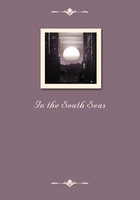
第71章 BUTARITARI(2)
In the midst of the thoroughfare,the church stands like an island,a lofty and dim house with rows of windows;a rich tracery of framing sustains the roof;and through the door at either end the street shows in a vista.The proportions of the place,in such surroundings,and built of such materials,appeared august;and we threaded the nave with a sentiment befitting visitors in a cathedral.Benches run along either side.In the midst,on a crazy dais,two chairs stand ready for the king and queen when they shall choose to worship;over their heads a hoop,apparently from a hogshead,depends by a strip of red cotton;and the hoop (which hangs askew)is dressed with streamers of the same material,red and white.
This was our first advertisement of the royal dignity,and presently we stood before its seat and centre.The palace is built of imported wood upon a European plan;the roof of corrugated iron,the yard enclosed with walls,the gate surmounted by a sort of lych-house.It cannot be called spacious;a labourer in the States is sometimes more commodiously lodged;but when we had the chance to see it within,we found it was enriched (beyond all island expectation)with coloured advertisements and cuts from the illustrated papers.Even before the gate some of the treasures of the crown stand public:a bell of a good magnitude,two pieces of cannon,and a single shell.The bell cannot be rung nor the guns fired;they are curiosities,proofs of wealth,a part of the parade of the royalty,and stand to be admired like statues in a square.
A straight gut of water like a canal runs almost to the palace door;the containing quay-walls excellently built of coral;over against the mouth,by what seems an effect of landscape art,the martello-like islet of the gaol breaks the lagoon.Vassal chiefs with tribute,neighbour monarchs come a-roving,might here sail in,view with surprise these extensive public works,and be awed by these mouths of silent cannon.It was impossible to see the place and not to fancy it designed for pageantry.But the elaborate theatre then stood empty;the royal house deserted,its doors and windows gaping;the whole quarter of the town immersed in silence.
On the opposite bank of the canal,on a roofed stage,an ancient gentleman slept publicly,sole visible inhabitant;and beyond on the lagoon a canoe spread a striped lateen,the sole thing moving.
The canal is formed on the south by a pier or causeway with a parapet.At the far end the parapet stops,and the quay expands into an oblong peninsula in the lagoon,the breathing-place and summer parlour of the king.The midst is occupied by an open house or permanent marquee -called here a maniapa,or,as the word is now pronounced,a maniap'-at the lowest estimation forty feet by sixty.The iron roof,lofty but exceedingly low-browed,so that a woman must stoop to enter,is supported externally on pillars of coral,within by a frame of wood.The floor is of broken coral,divided in aisles by the uprights of the frame;the house far enough from shore to catch the breeze,which enters freely and disperses the mosquitoes;and under the low eaves the sun is seen to glitter and the waves to dance on the lagoon.
It was now some while since we had met any but slumberers;and when we had wandered down the pier and stumbled at last into this bright shed,we were surprised to find it occupied by a society of wakeful people,some twenty souls in all,the court and guardsmen of Butaritari.The court ladies were busy making mats;the guardsmen yawned and sprawled.Half a dozen rifles lay on a rock and a cutlass was leaned against a pillar:the armoury of these drowsy musketeers.At the far end,a little closed house of wood displayed some tinsel curtains,and proved,upon examination,to be a privy on the European model.In front of this,upon some mats,lolled Tebureimoa,the king;behind him,on the panels of the house,two crossed rifles represented fasces.He wore pyjamas which sorrowfully misbecame his bulk;his nose was hooked and cruel,his body overcome with sodden corpulence,his eye timorous and dull:he seemed at once oppressed with drowsiness and held awake by apprehension:a pepper rajah muddled with opium,and listening for the march of a Dutch army,looks perhaps not otherwise.We were to grow better acquainted,and first and last Ihad the same impression;he seemed always drowsy,yet always to hearken and start;and,whether from remorse or fear,there is no doubt he seeks a refuge in the abuse of drugs.
The rajah displayed no sign of interest in our coming.But the queen,who sat beside him in a purple sacque,was more accessible;and there was present an interpreter so willing that his volubility became at last the cause of our departure.He had greeted us upon our entrance:-'That is the honourable King,and I am his interpreter,'he had said,with more stateliness than truth.For he held no appointment in the court,seemed extremely ill-acquainted with the island language,and was present,like ourselves,upon a visit of civility.Mr.Williams was his name:an American darkey,runaway ship's cook,and bar-keeper at THE LANDWE LIVE IN tavern,Butaritari.I never knew a man who had more words in his command or less truth to communicate;neither the gloom of the monarch,nor my own efforts to be distant,could in the least abash him;and when the scene closed,the darkey was left talking.
The town still slumbered,or had but just begun to turn and stretch itself;it was still plunged in heat and silence.So much the more vivid was the impression that we carried away of the house upon the islet,the Micronesian Saul wakeful amid his guards,and his unmelodious David,Mr.Williams,chattering through the drowsy hours.